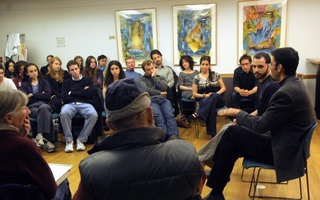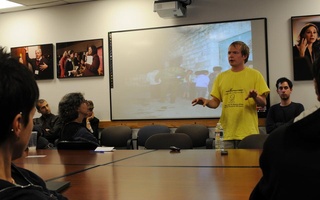Amahl Bishara, an assistant professor of anthropology at Tufts, challenged traditional ideas of objectivity in American media on Monday during a discussion of her new book, “Back Stories: U.S. News Production and Palestinian Politics."
The event—one in a series of speakers hosted by the Harvard Kennedy School’s Middle East Initiative—discussed the role Palestinian journalists play in U.S. news, and the effect of American media on Palestinian politics.
Bishara said her book provides an ethnographic approach to journalism in Palestine, and looks specifically at journalists’ experiences during Israeli invasions, attitudes towards journalists, the process of producing news, and the reasons journalists in the region pursue their work.
She said her book also examines American media’s dependence on and interpretation of Palestinian reporting, scrutinzing the concept of the “neutral American” reporter. Bishara said that American media often depends on reporting on the ground by Palestinian reporters, a relationship she illustrated by tracing a quote that first appeared in Palestinian news outlets before being used in the American press.
Bishara also said that because American and international reporters lack the institutional knowledge that Palestinian reporters have, they struggle to accurately report on the on-going conflict. She discussed issues with the media’s current attempts to appear fair by using “balanced objectivity.”
“I want to challenge the idea of objective news,” she said. “It always comes from a frame.”
Bishara emphasized that the points of focus within news articles—and the structure of news articles themselves—create a subjective lense through which the reader then sees Palestine.
For example, by presenting the Palestinian conflict through interviews with different groups involved, Bishara said international reporting suggests a sense of communication between the groups that does not actually exist.
Bishara also presented clips from her documentary “Across Oceans, Among Colleagues”, which she said was one of the first ethnographies of the Second Intifada, a period of intense Israeli-Palestinian violence between 2000 and 2005. The clips showed the experiences of award-winning Palestinian cameraman Mazen Dana, who was killed while reporting in Iraq in 2003. She said Palestinian journalists like Dana currently experience attacks on their professionalism and objectivity through both physical violence and legal obstacles.
Jeffrey P. Bieley, a student at the Harvard Kennedy School, said he found Bishara’s talk both relevant and insightful.
“It was interesting to hear about the limitations of journalism and the expectations of objectivity placed on journalism,” Bieley said.
Read more in University News
NRC Chair Talks Nuclear RegulationRecommended Articles
-
 Hillel Event Bridges Israeli-Palestinian Gap
Hillel Event Bridges Israeli-Palestinian Gap -
LETTER: Meaningless Distinctions in the Middle EastDoes it really matter whether the person who is illegally living on Palestinian land is an extreme right-winger or only a moderate right-winger?
-
 Palestinian Activists Evoke Occupy
Palestinian Activists Evoke Occupy -
Palestine, Israel and the Struggle for Equal RightsToday, Palestinians and Israelis are virtually equal in numbers living on the same land.
-
Birthright PalestineToday, around 4.5 million Palestinians live as refugees, scattered across the Middle East. The one thing that unites all these refugees is their insistence on their right of return to their former homeland.
-
White Israelis, Brown PalestiniansThe daunting challenges we face are political, military, and economic in nature. To invent a racial dimension blows open an additional chasm between our peoples, setting back the enterprise of coexistence yet another step.













